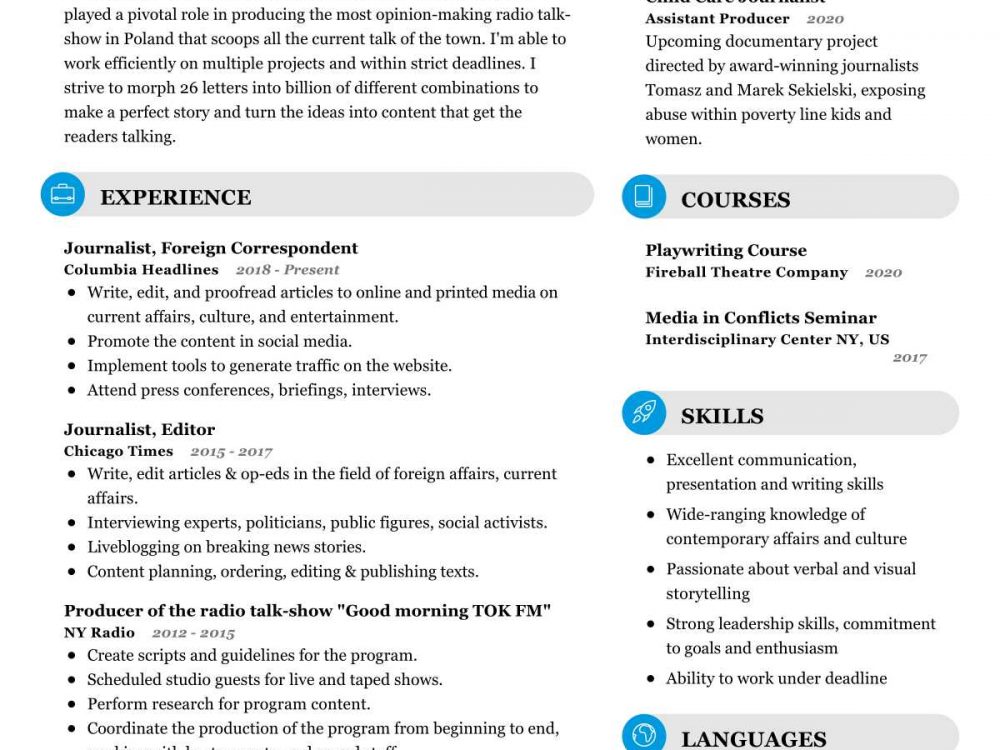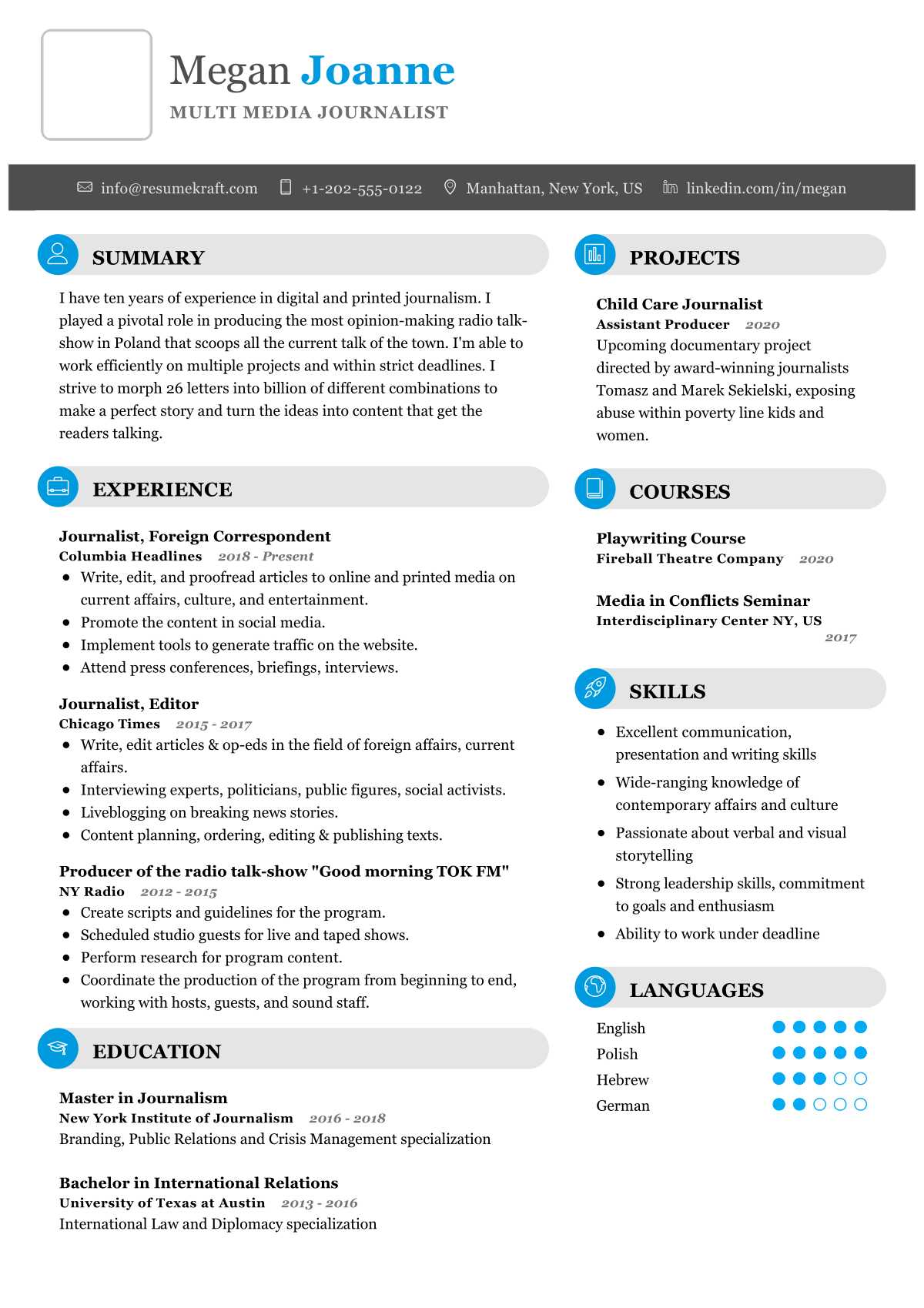Media Journalist Resume Writing Guide & Tips
Your Media Journalist Resume is your calling card to get your foot in the door and show potential employers that you have top media skills. But wait! There’s no such thing as a “perfect” resume, so you should consider customizing it to make sure it meets both of your needs. With this guide to customizing your resume and tips from industry professionals, you can showcase the skills and experience that will make you stand out from the pack.
How to write a Media Journalist Resume:
The following resume template will help you get started, but be sure to customize it slightly to make it yours. Use the following guidelines to help you get started:
Use your past experience and education in Media Production, Journalism and other relevant areas to create an industry-focused resume.
Focus on employment experience that is relevant to the job you want with preference for most recent jobs listed first. When listing dates for employment, list year first, then month and date of last day worked.
1. Contact Information for Media Journalist Resume:
Contact Information is the most important part of your Media Journalist Resume and this is the first thing that a potential employer will see on your resume. Your contact information should be listed at the top of your resume, directly underneath your name. The following information should be included:
Name
Address
Phone Number: Include area code numerals only (include work and cell phone if available)
Email Address: Use a professional email address relevant to area in which you are applying (i.e.
2. Summary for Media Journalist Resume:
The Summary statement should be a brief, succinct overview of the information that is listed on your Media Journalist Resume. This section should be located directly below your Contact Information.
3. Work Experience for Media Journalist Resume:
This is where you will be listing your work experience. You should explain how your job duties are related to the type of position that you want. List any pertinent skills or training that applies to the position, as well as any additional pertinent information about the position.
4. Education on a Media Journalist Resume:
This is where you will be listing your educational background. If you are not yet a college graduate, this is also the place to mention any relevant work experience that you have gained in the meantime.
5. Additional Skills for Media Journalist Resume:
If you have some additional skills that apply to the position, but they are not listed on your resume, make sure you include them here.
List of Typical Responsibilities For a Media Journalist Resume:
- research and report findings on a variety of media topics
- work on current events and politics as needed
- prepare still and moving images for television, print, radio or the web (must identify the format with your qualifications)
- create scripts for television, radio or web video or multimedia productions (must identify the format with your qualifications)
- create and edit audio or video recordings (must identify the format with your qualifications)
- write or edit news stories for print, web, television and radio as needed (must identify the format with your qualifications)
- get information from public records and other sources (such as interviews), checking facts and accuracy of information
- use a variety of software programs in a broadcast environment including desktop publishing, image manipulation, video editing, layout designs (for printed or web media) and related software programs (must identify the particular Software. e.g Photoshop.)
- must be able to work independently and take initiative with little direction and supervision
- must be dedicated, highly organized, a strong self-starter, multi-tasker, and deadline-oriented
- must maintain a fast pace while meeting deadlines under pressure with little supervision (must identify the particular Software. e.g Timeline.
Top 10 Must-have Media Journalist Skills:
- Research
Research helps you to find your way in the world of writing and editing, gives you a better understanding of what’s going on around you, it allows you to check out job ads, see what others are up to, and apply your unique skill-set. This will help to refine your skillset and make sure that when the time comes for formal employment, there is more than one choice. - Writing
Writing is of course the main skill you will need if you are going to use your skillset in Journalism, Media or Writing to get your foot in the door. This skill must be mastered as the place of work is not one where people will accept someone who cannot write on demand. As such a Media Journalist Resume will need to demonstrate you can write clearly, concisely, and grammatically correct and with flair. - Reader
Reading is the key activity of journalism, without basic knowledge of how it works, you will struggle to write or edit even the simplest stories. The skills needed to do this is becoming increasingly complex and require both an ability to read and an understanding of how things work. So what do you need to know? - Punctuation
This skill is hugely important for Media Journalism as it lays a firm foundation for checking copy, editing, and correcting spelling mistakes, and ensuring that your writing is sound and correct throughout. However: - Spelling
Though this is still important, much of Journalism these days is dictated by Written English, not the spoken language and so spelling should be less important than it once was. These days people also use spellcheck software to check their work, so errors are far less likely to crop up in this phase and spelling mistakes are far easier to spot. - Grammar/Citation style (Style Guide)
This is becoming more important as people use blogs and websites as their main source of information. However, for formal Journalism, the style remains an important aspect of the presentation, after all you want your audience to know that you are a Media Journalist worth listening to. Any errors will undermine this and so it is important that you are able to demonstrate that you have this skill. - Grammar editing
Though they differ in definition, both spelling and grammar are important for the Media Journalist Resume. The use of language is more predictable as it relies on familiarity and so it can be edited to suit different audiences. You do need to know the rules but also the exceptions and how to spot them. - Writer’s block
This is something that all writers face and it is something that you should be able to handle if you want a career in this field. Writer’s block is a mental thing, not a physical or technical one, as such, you will just need to find ways of overcoming it and getting your creative juices flowing again. - Formatting
This is an important skill and although it may not be the first thing that comes to your mind when you think of a Media Journalist Resume, it is still extremely important. There are many sites online that teach you how to format your documents but they can be a bit overwhelming and so there are guides available that will give you step-by-step instructions on how to do this. - Social Media
A big part of what you will need to do at work is to be active on social media sites. This is becoming more important as people are looking for information and news that they can share with their friends and family. This means that you need to constantly post new content, so this skill cannot be underestimated.
Tips to write a Media Journalist Resume Summary:
Your Media Journalist Resume Summary should be about three [3] to four [4] Key Skills, Experience, and Supportable Achievements that will show your skills and experience in a way that will get you noticed. It should be a list of skills, experiences, and achievements. it should be objective and factual:
Summary example:
“A creative, goal-oriented, and results-driven media professional with over 5 years of experience in the field of journalism and multimedia. Skilled at identifying opportunities, conducting research, and developing inspirational and creative storylines to create content for various media such as print, radio, television (TV), web, or new media. Experienced in writing articles for Newspapers, Magazines, Radio, and Television News Channels. Has a proven track record of achieving high standard results in Media Relations.”
How to write a Media Journalist Resume with No experience:
The most important part of your resume is the opening paragraph. It’s good to have some experience in your section just in case someone checks your resume and runs across it. But don’t list your jobs under the heading “Work History.” Instead, put them at the top of another section!
Top ten tips for writing a Media Journalist Resume (and tips for making a good impression)
- Make sure you emphasize what you do on your application – not what you did.
- Make your Media Journalist Resume easy to read. Avoid clutter and poor word flow.
- Don’t make your Media Journalist Resume think about what you want them to think about. You have one chance of making a good impression on them, so make sure it’s YOU!
- Use simple formatting and a document that is easy to read. Make sure the font size is reasonable, and try using different colors to make reading your resume easier!
- Don’t be afraid to be creative – just remember that it’s a “working document”.
- If you know you’re applying for a position where Media Journalist Resume experience is necessary or desirable, then start from there. But if not…
- A basic template is okay, but it’s important to remember that a Media Journalist Resume isn’t just a list of jobs you’ve held. It’s also an introduction to how you think, and what your goals are.
- Use bullet points as much as possible. The less words, the better!
- Don’t create a resume with too much blank space or white space on it – this will make it look unprofessional and will distract from the purpose of your resume: To get yourself a good job!
- Use the font in a way that makes sense. If you’re applying for a job as a television reporter, make sure your resume is easy to read and pleasing for the eye!
How to write a Media Journalist Cover Letter:
A cover letter is an introductory document that accompanies the application package, which includes the resume. Media professionals should always include a cover letter with their resumes to demonstrate why they are an ideal candidate for the job. Here are some tips on how to write a Media Journalist Cover Letter:
Step 1:
Write your name in the upper left corner of the page. Next to it, write your full contact information including address, email address, and phone number(s).
Step 2:
The body of your Media Journalist Cover Letter should be brief and identify exactly how you’re qualified for the job. Highlight some of your strengths, skills and experience that directly relate to the position you’re applying for.
Step 3:
End with a cordial closing line such as “I look forward to hearing from you” or “I will call at your earliest convenience”. Use your best judgment in this step.
Key Takeaways:
- A resume should be carefully crafted and tailored to the experience you want to highlight.
- Personalize your resume with content that’s relevant and informative.
- A good cover letter can help secure an interview – even if you haven’t gotten a call back from an employer yet.
- Tailor your resume, cover letter, and email to each prospective employer.
- Include education on your resume as well as details on your employment history.


